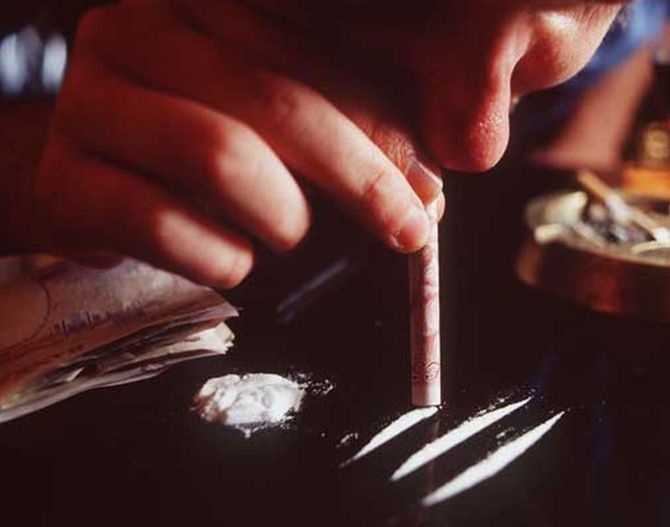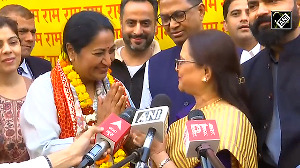
'Almost 60 per cent of the 2,000 songs had references to drugs and violence.'
'Drugs are not a problem of poverty, but a problem of plenty.'
Dr Dheeraj Sharma, a professor at the Indian Institute of Management-Ahmedabad, while researching Punjabi pop music, discovered how many songs glorify drugs and violence.
His research was on the influence of lyrics containing references to drugs and violence and its influence on drug usage, a propensity to commit violence and the attitude towards women in Punjab.
Dr Sharma spoke to Syed Firdaus Ashraf/Rediff.com in the wake of the controversy over the film Udta Punjab, which is about about Punjab's drug problem.
What was the reason for your research on Punjabi pop songs?
There is a considerable amount of concern about the use of violence and glorification of drug use for the last several years in the Indian context. In the United States, it has been there for quite some time.
Media reports in India talks about the glorification of gangsters, drugs, violence and materialistic values and that was my motivation. Past research in the American context has demonstrated that repeated listening to gangsta music induces violence in listeners.
Why did you choose Punjabi pop music in particular? Did you feel there is a problem in Punjabi society?
There were many media reports that drug use in Punjab was quite high. One should try to ascertain what are the reasons for high drug usage in Punjab. One has to investigate the reasons and those reasons are multi-faceted.
Those reasons can be socio-cultural, proximity to the border, economic, materialistic values or glorification of drug use and violence.
I looked at one facet which is ignored in the Indian context because we only blame political as well as administration authorities. They may be a contributor, but I think glorification of drug usage through songs is significantly impelling youth to consume more drugs.
You hear Punjabi songs and you will come to know that. 'Charas mainu chad-di' is popular in the lyrics of songs and also in common parlance in Punjab.
We used psychometric scales to assess whether listening to Punjabi pop music had high propensity to commit violence, high intent to consume drugs and negative attitude towards women.
How many songs did you select?
We randomly selected 200 people and each person gave a list of 50 songs. They were between the ages of 18 and 25. Technically, there were 10,000 songs, but there were overlaps too. Overall, we came across 2,000 songs that we reviewed.
How many songs were about drugs?
Almost 60 per cent of the 2,000 songs had references to drugs and violence.
Songs and art reflect what is happening in society.
No, it is not like that. There are two paradigms. One says that culture, the media, film and art reflects what goes on in society. But there is enough evidence which says that they also shape what is happening in society.
Cultural changes come and they are not coming naturally, but it comes as a result of what you see.
You tell me, what is advertising? Billions of dollars are spent on advertising. What is the purpose of it?
You try and imitate a (celebrity). You wear a perfume because you want to smell like Amitabh Bachchan or Nicole Kidman. It influences you.
Art reflects what happens in society, but at the same time it also influences what happens in society.
What is your suggestion for these song makers who speak of drugs?
The government must not censor these songs. Censorship is not a solution. If you do that, then there will be more demand.
The government can offer an advisory that all these singers must exercise discretion while using lyrics which glorifying the usage of drugs.
At the University of Michigan in the US they do psychometric tests almost 50,000 students every year to see what behavourial changes are occurring due to the onslaught of different messages coming from the media. From this you come to know what is happening.
The government must have a body which monitors what are the behavourial changes in youth.
What is your personal take on Udta Punjab?
The issue of drug usage has been shown in films right from the times of Dev Anand. He showed it in Hare Rama Hare Krishna. The hippie movement in the US was reflected in it. Because they have called the film Udta Punjab that makes the state look bad and political people will have concerns about that.
Drug usage is there in almost every state. In many states like Uttar Pradesh and Rajasthan you have a licence for soft drugs (Bhang).
I saw the trailer of Udta Punjab two days ago and I think other than the reference to the state everything is fine.
You feel the objection to using the word 'Punjab' in the movie title is justified?
Drug usage is there in Punjab, but if you show it in negative light you are further glorifying it.
Why did this problem of drugs start in Punjab? Why did it catch on?
I think drug usage in Punjab was there as soft drugs in colleges. The problem now is that access has increased. Secondly, alcohol is comparatively more expensive.
The people who consume alcohol become extroverted whereas the person who takes marijuana becomes subdued. It calms a person and that could be another reason why people prefer taking it.
Another point is a small drug pill is all that's needed for a high.
Did you speak to song makers why they write such lyrics?
I met some producers of these songs whom I won't name. They told me that if there is no usage of drugs and violence it is very difficult to sell a song. They have to appeal to the macho image of the youth.
Drugs are non-conformist and these songs work for people who are non-conformist and anti-establishment. And if there is violence, words in the song like 'Maar Deta' also work.
Where about Bhangra music?
Traditional Bhangra music has almost gone. Bhangra music has been sidelined due to cultural change.
The demographics have changed. There is affluence in society.
Drugs are not a problem of poverty, but a problem of plenty.











 © 2025
© 2025